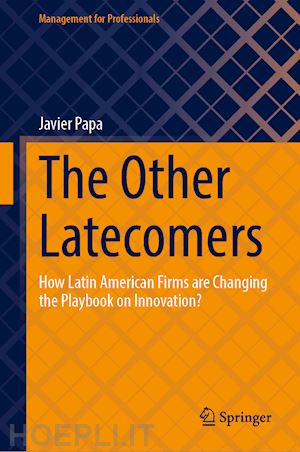

Questo prodotto usufruisce delle SPEDIZIONI GRATIS
selezionando l'opzione Corriere Veloce in fase di ordine.
Pagabile anche con Carta della cultura giovani e del merito, 18App Bonus Cultura e Carta del Docente
In recent years, developing countries have seen the emergence of successful and innovative firms, albeit often with state support. Argentina, which faces challenges including industrial decline and macroeconomic turbulence, offers an intriguing context for studying latecomer firms, as few have managed to innovate and compete globally without significant state backing.
This book examines why and how latecomer firms facing adverse policies and hostile macroeconomic conditions can nevertheless survive, grow, and catch up with global competitors, while many other firms lag or fall further behind. It presents, on one hand, a theoretical framework that builds on contributions made by Gerschenkron (1962) and Hobday (1995) on latecomer catch-up in economic development theory, and on those by Nelson (1991, 2008) on firm-level differences in evolutionary theory; on the other, it provides a contextual framework for the catching-up experiences of firms from East Asia and Latin America, which ends with a description of Argentina’s main detrimental policy regimes over the past 50 years.
Further, the book presents an statistical analysis of manufacturing firms’ performance, along with the corporate characteristics that underlie it, within the context of Argentina’s worst economic crisis to determine which firm characteristics stood out during times of crisis (e.g. innovation and organizational capabilities). To supplement the quantitative analysis and offer additional insights, it introduces two in-depth case studies on iconic latecomer firms, TENARIS and IMPSA, which, bolstered by the examination of over nearly half a million newspaper articles, illustrate their global success amidst numerous challenges. It emphasizes the importance of long-term corporate strategy, a flexible organizational structure, and a coherent set of technological and organizational capabilities, while also addressing policy implications, making it a valuable asset for researchers, policymakers, and corporate managers alike.
Introduction.- Theoretical and Contextual Frameworks.- Statistical Analysis of Latecomers’ Innovations in Time of Crisis.- Case Studies of Two Latecomer Firms: Methodology.- Case Study of TENARIS.- Case Study of IMPSA.- Conclusions.
Javier Papa is the former Under Secretary of Energy Planning, Ministry of Economy, Argentina (2020-2021). He is Director of the Research Centre on Science, Technology and Innovation for the Energy Transition and Associate Professor in the Energy Engineering Graduate Program, both at the National University of San Martin, Argentina. In addition to his academic career, he has worked as a senior economist for the South East of England Development Agency, at the British Government, as well as Assistant Director (AP) for Economic Research in both the Ministry of Finance and Ministry of Business, Enterprise and Innovation, at the Irish Government. He holds a Ph.D. in Economics of Innovation from the Max Planck Institute of Economics – FSU Jena (Germany), an MSc in Public Policies from SPRU – Sussex University (UK), and a Licentiate (BSc + MSc) in Economics from University of Buenos Aires (Argentina).











Il sito utilizza cookie ed altri strumenti di tracciamento che raccolgono informazioni dal dispositivo dell’utente. Oltre ai cookie tecnici ed analitici aggregati, strettamente necessari per il funzionamento di questo sito web, previo consenso dell’utente possono essere installati cookie di profilazione e marketing e cookie dei social media. Cliccando su “Accetto tutti i cookie” saranno attivate tutte le categorie di cookie. Per accettare solo deterninate categorie di cookie, cliccare invece su “Impostazioni cookie”. Chiudendo il banner o continuando a navigare saranno installati solo cookie tecnici. Per maggiori dettagli, consultare la Cookie Policy.